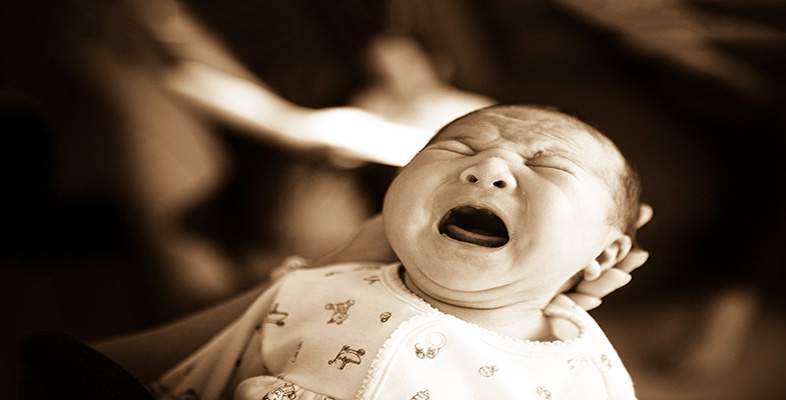6.2 Communicating need
Daisy could tell the difference between Mia's cries quite soon after birth. Some babies may not communicate their various needs quite so clearly as Mia, and carers have to work hard to interpret them. Carers who can make time to watch, listen and ‘be there’ for the baby can try different things, asking others if they are not sure. Most babies will tell you if their needs are not being met – by the way they know best: crying!
Below are extracts from accounts of two babies, observed at the time of their birth. They show very different temperaments, and different parental reactions.
Everyone in the delivery room was struck with how competent and controlled this alert little boy was, moments after birth. His father leaned over, talking to him in one ear. Immediately, Robert seemed to grow still, turning his head to the sound of the voice, his eyes scanning for its source. When he found his father's face, he brightened again as if in recognition … As he was cuddled, Robert turned his body into his father's chest and seemed to lock his legs around one side of his father … By this time, his father was about to burst with pride and delight.
Chris … was one week overdue. His mother knew [he had] not gained [weight] for the past three weeks, but … no one [had] paid particular attention to her comment, ‘He's slowed down’ … When he was first born, the nurse and obstetrician were concerned about his colour and lack of response … Assured by the nurse and doctor that he was intact, their hearts nevertheless sank when they saw his wizened face, with ears which protruded … His mother … began to wonder what she had done to her baby … As he lay wrapped in their arms, he looked peaceful enough. But when he was moved even slightly, his face wrinkled up into a frightened animal-looking expression, and he let out a piercing, high pitched wail. They were relieved when the nurses took him away ‘to take care of him’.
(Berry Brazelton and Cramer, 1991, pp. 76–9; reproduced in Oates, 1994, pp. 201–3)
These extracts are of course selective, and don't show the whole picture of the babies’ births or what happened afterwards. But they provide powerful accounts of these babies’ experiences of birth and the world. They also illustrate how the babies reacted to it at this early stage, and how these reactions had a deep effect on the adults around them and their relationships with the baby.
Although we cannot know exactly what he felt, the account of Chris gives an impression of how miserable and frightened he must have felt, as well as lacking in energy. The hospital's delay in intervening to deliver him when his mother thought something was wrong and the guilt she seemed to feel at his condition when he was born will take time to work through. Chris's experience of the world so far is of something that is alarming and not a safe place. You can see his parents reacting anxiously to him, his appearance of vulnerability and his unsettled behaviour.
On the other hand, Robert doesn't seem worried by the world he has come in to and immediately settles into relationships with his parents and taking an interest in the world around him. This has a reassuring and rewarding effect on his parents and others who meet him.
In case you are wondering if babies like Chris can be damaged by their experiences in hospital, there is some reassuring evidence from a television programme that this is not necessarily the case. A baby who had spent quite a bit of time in an incubator after birth was encouraged to visit the hospital at around two years old to see if it brought back unpleasant memories. It didn't. Of course, it's too simple to draw firm conclusions from this, and the parents had loved and supported the child continually through his experience. But it's worth bearing in mind that early experiences can be compensated for.
